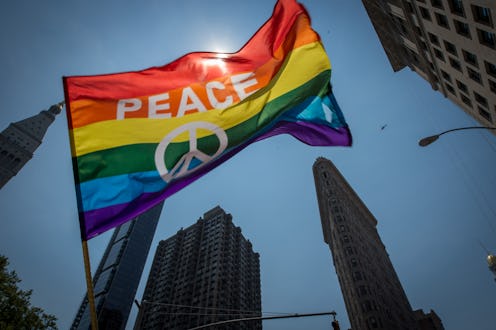
School can be a tough environment for anyone, but for LGBTQ youth, facing harassment, bullying, and abuse can make a serious impact in both their short- and long-term health. And according to recent data from the Human Rights Watch, state-run schools are failing LGBTQ youth in the United States by not doing something that should be a requirement: Keeping them safe. Safety is integral to having a healthy and happy learning experience, and when schools fail to keep their students safe, they're fundamentally failing in their mission.
The HRW's report brings up some seriously concerning points: Many schools do not have policies that explicitly protect LGBTQ youth from bullying or abuse on the basis of gender identity or sexual orientation, making it easier for harassment to occur without appropriate punishment. And this report was no small sample size, either: The HRW surveyed 500 students, teachers, and administrators, and parents, from across the country, including Alabama, Pennsylvania, South Dakota, Texas, and Utah.
Teachers struggle to protect LGBTQ students, a point recently discovered in the Gay Lesbian Straight Education Network's (GLSEN) 2015 data, as well. Sadly, many teachers express feeling uncomfortable intervening when it comes to issues based on sexual orientation or gender identity, leading students to feel more isolated and misunderstood.
The HRW's survey makes another concerning discovery in a similar vein. Eight states actually have laws forbidding teachers and staff from talking about LGBTQ issues at school. This correlates with the GLSEN data which suggests that few students learn about LGBTQ issues or LGBTQ-identified people in the classroom.
Why does this matter? Talking about LGBTQ issues normalizes them and better educates both queer and non-queer students, creating a culture of more understanding and acceptance. Explicitly including LGBTQ students in policies ultimately protects them and sets a precedent that bullying and harassment are not OK.
Of course, if you don't work in education, you may feel like there is nothing you can do to help. That's not the case! Everyone can help LGBTQ youth, even if you aren't a teacher or a parent. I've broken down five ways you can help LGBTQ youth below.
1Educate Yourself
Whether you identify as queer or not, LGBTQ youth will be more than happy to have you on their side! One of the most important ways to be an ally is to educate yourself first. If you identify as LGBTQ yourself, it's still important to get informed about intersectional issues and remember that LGBTQ youth may have different experiences today than we did, in both positive and negative ways.
If you aren't LGBTQ-identified, it's important to educate yourself on the spectrum of queer issues and spend time listening, reading, and asking questions before you insert yourself as an ally in a sensitive space.
2Volunteer Your Time
If you have free time in your schedule, volunteering can be beneficial for both you and the community you're serving. There are always opportunities to volunteer with your local community center, some of which even have devoted LGBTQ spaces. You can also look into options for LGBTQ-friendly summer camps, like Camp Lightbulb, or job and internship programs that are queer-inclusive.
3Reach Out To Your Representatives
Want to help youth but don't love interacting with kids and teenagers? That's OK! You can still be a great advocate for the cause. Reaching out to your local and state representatives is a great way to get involved and use your resources as a source of power — especially when we consider that on the whole, LGBTQ youth are often not old enough to vote, even though many laws and policies do impact their every day lives. Educate yourself on the issues in your area, and reach out to express your support or dissent.
4Promote LGBTQ Media and Entertainment
Personally, I think this concept is under-discussed as a means of activism. There are a ton of awesome sources for LGBTQ media out there, whether you prefer books, comic books, television shows, movies, documentaries, music, or any number of other options.
Giving youth books that feature queer characters, or speaking positively about movies that feature queer story lines, sends a message that these experiences are valid. Whether the youth you're talking to is LGBTQ or not, speaking positively and sharing the experiences of queer creators is always a good move.
5Know Your Resources
None of us can be all things for any person, but knowing how to refer people to the help they need is always important. There are many hotlines and organizations that are specific to the LGBTQ community, and if you're in an allyship role, it's a good move to have a running list of resources you know are queer inclusive.
The Trevor Project is focused on suicide prevention for queer youth, for example. There are also organizations like Crisis Text Line that are super teen-friendly because they allow you to literally text a counselor instead of picking up the phone or making an appointment. Having resources you know are queer-friendly ready to go can make it easier to step in and guide someone to help when they might need it.